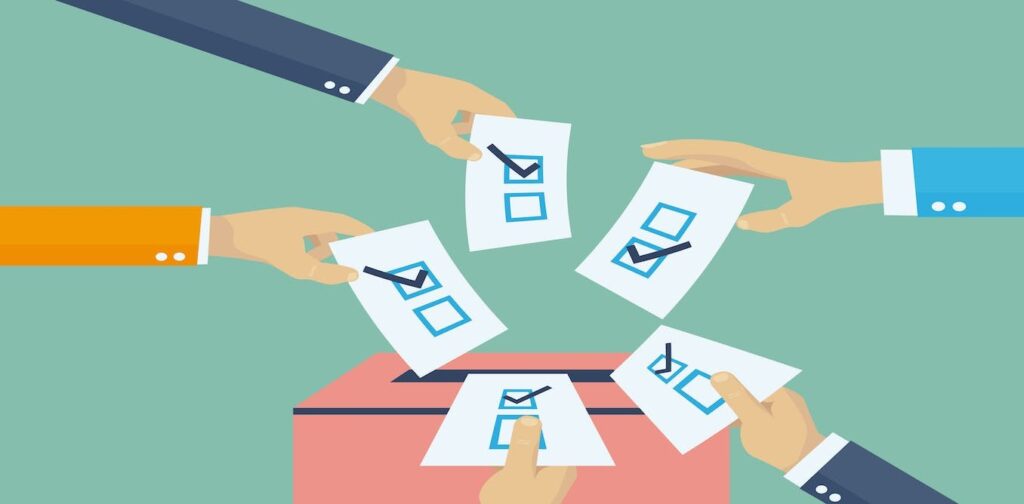
There are over a million licensed physicians in the United States and the District of Columbia (Ref 1). Voting can be one of the most powerful social determinants of health. Our ability to lead healthy lives is affected by not only healthcare but health and public health policies. Nonetheless, it appears that physicians vote less than general population.
In 2007, Grande and colleagues reported that a subgroup of physicians that are eligible to vote, voted about 9% less than lawyers and general population (Ref 2). In that study, authors performed a cross-sectional survey of 350,870 participants from 1996 – 2002, including 1274 physicians and 1886 lawyers.
A more recent analysis of physicians voting from 2006 – 2018 showed that voter participation among eligible physicians in California, New York and Texas was 14% lower, then that of general population (Ref 3).
Comparatively, another study: “Analysis of Reported Voting Behaviors of US Physicians, 2000-2020” published in January 2022, points out that the physicians’ voter engagement may have improved in recent years (Ref 4). However, their analysis also showed that pooled physician voter turnout was lower than general population. Interestingly, in 2018 midterm elections, individual election results showed that physicians had similar voter turnout as the general population but higher turnout than general population in 2020 Presidential Election.
Elected official respond to the preferences of voters, not non-voters. (Ref 5)
Even if there is a trend in recent years of increased physicians’ civic participation and voting habits, there are still some commonly cited obstacles to participating more.
The reasons are many and possibly depend where in the career physicians are.
Medical students and trainees are busy with work. Indeed, recent articles “Barriers to Voting in 2020 Among Resident Physicians” reported that time was the most commonly cited barrier to for them to vote (61%). Twenty-three percent reported psychological barriers (perception that one’s vote does not count), 14% logistical hurdles (when or where to vote), and 4% voter registration. Forty-six individuals (26%) cited multiple barriers to voting (Ref 6).
Faculty and practicing physicians have similar issue with long hours and available time.
Additional logistical barriers might include not knowing where to register or where to vote. Indeed, during their education, training and career, physicians might be changing location often. As a result, it might be logistically hard for them to know where to vote or where to register to vote.
Additional psychological barriers include not wanting to appear “political” and viewing civic engagement as something not “compatible” with unbiased practice of medicine.
What can we do support potential increase in trend of physician’s civic participation?
Addressing logistical barriers:
- PRE-VOTING:
- Register to Vote.
- Find Locations where you can vote.
- Study candidates and what they support.
- Discuss with friends and colleagues or do your own research if things are not clear in regard to logistics, candidates, or policies.
- Preparing to vote takes planning. Preparing to vote takes time.
- VOTING:
- Vote early.
- If unable to vote in person, vote by mail-in ballot (absentee ballot).
- Plan for the best time of the day for you to vote. In general, voting early in the day before work or late in the day after work might be easier to put on the schedule. However, double check opening and closing hours, to assure polls are open. If going to the polls before or after work, allow yourself enough time, in case polls are crowded.
- Vote on the day off.
- For training programs: attendings could help trainees by offering to hold their pagers/phones while they vote, if logistically, polling sites are close and if long absence would not interfere with duty hours limitations and sometimes complex scheduling.
Addressing psychological barriers:
- Talk about voting with colleagues at work. That can sometimes encourage them to think about voting and go out there and vote.
- Support each other by offering to help and letting each other go and vote.
- Normalize voting and civic engagement independent of personal beliefs and politics.
- Keep it non-partisan.
- Be tolerant to others’ beliefs.
- Start early: create civic engagement habit by educating our children, students, and patients early in their lives, so that civic engagement is a durable habit.
This article was also published by Physician’s Weekly: “Why Don’t Doctors Vote… or Do They?”
REFERENCES:
- FSMB Census of Licensed Physicians in the United States, 2020 https://www.fsmb.org/siteassets/advocacy/publications/2020-physician-census.pdf
- Grande, D., Asch, D.A. & Armstrong, K. Do Doctors Vote? J GEN INTERN MED 22, 585–589 (2007). https://doi.org/10.1007/s11606-007-0105-8
- Lalani HS, Johnson DH, Halm EA, Maddineni B, Hong AS. Trends in Physician Voting Practices in California, New York, and Texas, 2006-2018. JAMA Intern Med. 2021;181(3):383–385. doi:10.1001/jamainternmed.2020.6887
- Ahmed A, Chouairi F, Li X. Analysis of Reported Voting Behaviors of US Physicians, 2000-2020. JAMA Netw Open. 2022;5(1):e2142527. doi:10.1001/jamanetworkopen.2021.42527
- Iyengar, S., & Jackman, S. (2004). Technology and Politics: Incentives for Youth Participation. Working Paper 24. Center for Information and Research on Civic Learning and Engagement.
- Lalani, H.S., Hong, A.S. & Siddiqui, R. Barriers to Voting in 2020 Among Resident Physicians. J GEN INTERN MED 36, 254–255 (2021). https://doi.org/10.1007/s11606-020-06308-w
Dr. Jasminka Vukanovic-Criley MD, FACP, FHM is a multiple award-winning physician, hospitalist, healthcare & education innovator & Associate Clinical Professor of Medicine at UCLA. She is a career mentor & advisor to undergraduate, graduate & postgraduate students & faculty across medicine, science & education. As Founder & CEO of Indelible Learning, Dr. Criley leads a systems-based approach to learning grounded in the belief that we grow geniuses by making complex systems visible, before real-world decisions carry irreversible consequences. Her research focuses on designing evidence-driven digital games & simulations that help people see, question, & improve systems across health, civics, science & human behavior. Dr Criley is a sought-after speaker, a founding Board member of Physician’s Weekly & an advocate for learning experiences that build judgment, agency & healthier institutions. She can be reached on X at @criley_md and at www.linkedin.com/in/jasminka-criley-md